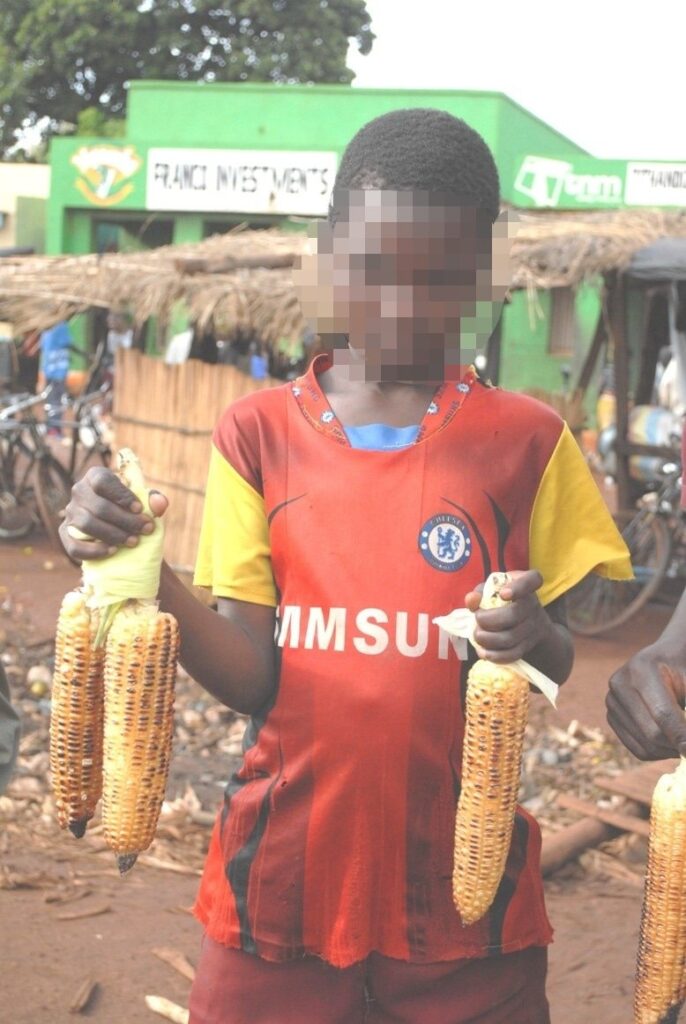By Yamikani Yapuwa
A small boy selling roasted maize at a bus depot – Pic by Abel Ikiloni, Mana
Blantyre, April 20, Mana: The United Nations Children’s Fund (UNICEF) and International Labour Organisation (ILO) Child Labour: Global estimates of 2020 indicate that 8.9 million children will be in child labour by the end of 2022 as a result of rising poverty heightened by the Covid-19 pandemic across the globe with most of the children involved with hazardous work.
True to this assertion is the story of a 13-year-old boy only identified as Mark to conceal his identity and 14-year-old girl disguised as Margret who sell flitters, freezes, thobwa (sweet beer) at Chirimba Market while classes are in session.
Mark comes from Mulanje and was employed to sell thobwa and flitters for his boss where he currently resides.
“I came to Blantyre in 2021 to work after experiencing untold poverty in our household. I sell thobwa and flitters for my employer. She pays me K12, 000 per month.
“Every day, I wake up at 5:30 a.m. to do other household chores then carry a cooler box of thobwa and a bucket of flitters to the market. I’m supposed to go back home after all these are sold out,” explains Mark.
Similarly, Margret was brought to Blantyre by her aunt who found her a job at her friend’s house.
She now sells Malambe (Baobab) Juice and water at Chirimba Bus Stage commonly known as ‘Pa ma Land Rover’ and does not go to school just like Mark.
“My mother and three siblings stay in Zomba and depend on me since my salary of K13, 000 is sent directly to her to buy food for my siblings who are between the age of three and eight,” says Margret.
Both Mark and Margret vow that they cannot leave their jobs because their parents and siblings in the village rely on the money they earn.
“I don’t mind being out of school so long as I get my salary and help my mother and siblings in the village,” challenges Margret.
Mark interjects: “After all, they give me breakfast, supper and shelter. Although I don’t go to school, I’m better off compared with life back in the village.”
Both Mark and Margaret refused to disclose the identity of their employers and the specific area where they stay for fear of reprisals.
KWENDA- Child labour exposes children to hazardous situation that jeopardizes their rightful development
Lucy Stephano, a second-hand clothes vendor who goes to various mobile markets around Blantyre District says the sight of young girls and boys vending is common in the markets and bus depots.
“I normally go to Mbayani, Lunzu, Chadzunda, Mdeka and Chikuli from Monday to Saturday to sell my merchandise; in all these days, I meet girls and boys as young as 10 who are employed to sell various food stuffs like thobwa, mandasi, water, malambe juice, among others.
“It is obvious that they do not go to school because they normally sell their items when their colleagues are in class,” observes Stephano.
Head of Child Labour Unit in the Ministry of Labour, Francis Kwenda says what Mark and Margret are going through amounts to child labour.
“Child labour is any work that affects the child physically, morally, mentally, spiritually and deprives the child’s right to education,’” says Kwenda.
The 2020 UNICEF-ILO Report shows that 160 million children were involved in child labour globally at the beginning of 2020 out of whom 9.6 million are in Southern African Development Community (SADC) countries.
Locally, Kwenda says the 2015 National Child Labour Survey reveals 38 percent of children aged between five and 17 are engaged in child labour.
“Statistically, the survey revealed that there are 2, 678, 580 children who are working out of whom 2, 118, 630 are in child labour, representing 38 percent,” Kwenda states.
“1, 163, 639 children are in hazardous child labour representing 20.9 percent; 954, 992 children are in other child labour related work while 559, 949 are working but not in child labour,” explains Kwenda.
Kwenda adds that engaging children in child labour violates their right to education, leisure and proper development as they are exposed to hazardous environment that inhibits their rightful development.
Nevertheless, Youth Net and Counselling (YONECO) Executive Director, MacBain Mkandawire says children like Mark and Margret face tremendous danger as human rights risks are often most pronounced in such setups resulting into sexual abuse for girls as well as initiation into criminal activities for boys.
MKANDAWIRE- We need child labour interventions that looks at domestic context
“In case of girls, such environment makes them vulnerable and exposed to men who abuse them sexually,” Mkandawire laments.
“In such instances, the children are interacting with people of different characters and they relate with people with bad characters which may lead into criminal activities and later, they turn into criminals themselves,” he says.
Adding: “Quite often, the children are also given instruction by their employer to go back only when they have finished selling their lot and this takes a toll on their nutrition as it means they will only eat and rest in the evening after the day’s work.”
Mkandawire suggests the need to come up with serious child labour interventions which look at child labour in a domestic context as well as prevent child labour from taking place.
“We have been talking about child labour in tobacco estates but there are many children who are working as domestic workers.
“They grow up as domestic workers with no education and when they grow into adults, they end up in prostitution. That is how the issue of child labour becomes complex,” adds Mkandawire.
He observes that Malawi has put much emphasis on trafficking in persons to other countries neglecting the trafficking that is happening within where children are taken to towns and work as domestic workers.
However, Kwenda says the ministry has developed the National Child Labour Mainstreaming Guide aimed at luring the institutions and partners to mainstream child labour issues in their routine activities.
“The ministry has also ratified the ILO Conventions 138 on Minimum Age of entry into employment and Convention 182 on the Worst Forms of Child labour,” Kwenda points out.
“The ministry also applied for Malawi to be a Pathfinder country; Pathfinder countries are countries that have promised to accelerate the elimination of child labour faster than the rest of the signatories,” he adds.
Kwenda says this is following the development of the Sustainable Development Goal (SDG) number 8 and the Alliance 8.7 of the ILO.
He emphasizes that district labour officers across the country have also been designated as enforcement agents of the Trafficking in Persons Act to make sure children trafficked for economic exploitation are rescued and necessary action taken on the culprits.
Mana/yy/and/ys
The post Safeguarding children from jaws of child labour appeared first on Malawi Voice.
 Moni Malawi
Moni Malawi 

